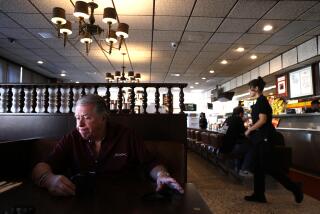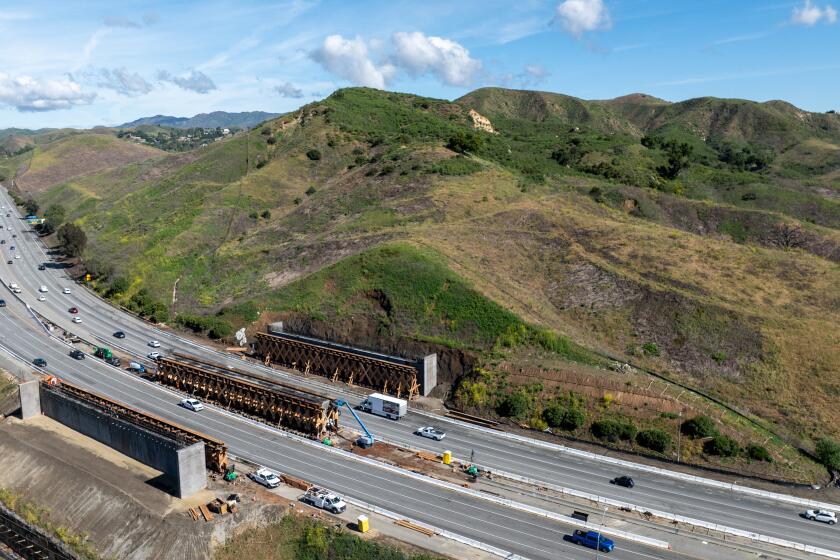Ending Coyote Trapping Is Called Misguided : Legal issue: Experts are in general agreement that the city of Los Angeles cannot be held liable for attacks by wild animals.
Legal experts say a misguided fear of lawsuits may have unduly influenced the city of Los Angeles’ decision in June to stop trapping coyotes.
The Board of Commissioners of the Department of Animal Regulation voted June 28 to ban all coyote trapping by its employees. At the time, commissioners said they feared the city might be sued for negligence if a coyote eluded capture and ate some homeowner’s pet or attacked a child.
The theory was that if the city took no action to control coyotes, it would not be legally liable for failing to catch a few.
But some private civil attorneys and even the city attorney’s office--which was not asked for a legal opinion in the matter--say the city is not liable for damages caused by coyotes whether city employees trap none, some or all of the animals.
“To trap or not to trap is not the basis for a lawsuit,” Assistant City Atty. Thomas Hokinson said. He said no one has ever filed a lawsuit for injuries or damages caused by coyotes.
Browne Greene, a prominent Santa Monica civil attorney and former president of the California Trial Lawyers Assn., agrees with that assessment.
Referring to his profession, Greene said: “As creative as we are, it would be difficult to fashion a liability case” against the city for damage caused by a wild coyote coming down from the hills. “If a client came to me to file a lawsuit, I’d probably say, ‘I’m sorry, there isn’t a case.’ ”
Two years ago, the city captured 93 coyotes. But that dropped to 37 for the 12-month period ending in June, when the city stopped using rubber-padded, steel leg-hold traps. For humane reasons, it substituted cages that trapped the animals without harming them, although the animals still were destroyed later. At the same time, the number of attacks on pets increased from 146 to 218.
But animal rights activists, such as the California Wildlife Defenders, continued lobbying for a complete ban on trapping, arguing that the city should not manage wildlife.
That lobbying had some impact on the decision. But the board’s action was also motivated by a desire to distance the city as much as possible from the coyote problem, for fear of suits.
In fact, a private attorney who is a member of the Wildlife Protection League, an animal rights group, argued before the commission that she believes the city could have been liable for damages if the city continued trapping coyotes. Attorney Diane Parrish, in an interview, said that she believes that if the city makes a voluntary effort to protect its residents from coyotes by trapping them, the city in effect waives its statutory immunity from suits.
But Hokinson said the city is not under any duty to protect its citizens from wild creatures, which are in their natural environment.
Encino civil attorney Gary L. Barr said the only way the city might be liable is if officials trapped a coyote and then through negligence the coyote escaped and injured someone.
“So the city might be escaping some liability that way by not trapping coyotes anymore,” Barr said.
After being told of the attorneys’ opinions, Animal Regulation Commissioner Mimi Robins said that the liability issue was “not a big factor” in her decision to support the ban.
“You could trap thousands of coyotes and there is no way you could get them all,” Robins said. “People who live in those areas have to be responsible for their pets. We were giving homeowners a false sense of security.”
Gary Olsen, the Animal Regulation Department’s acting general manager, said the ban on trapping coyotes will not save the department money, but rather will allow its three staff members who had trapped the animals to concentrate on other matters.
Some Valley homeowners have expressed concern that the ban on coyote trapping will leave them unable to effectively deal with coyotes that prey on pets and, in rare instances, attack small children. A coyote killed a 3-year-old girl in the front yard of her home in a hillside area of Glendale in 1981. Two years earlier, a coyote tried to drag a 13-month-old baby out of a yard in Agoura. That child survived.
In the past year, the city received more than 500 requests from residents for coyote trapping services from worried pet owners.
“They have chosen to sacrifice the defenseless domesticated animals under the pretext of protecting wild animals,” said Bruce Bialosky, who lives in the hills above Studio City.
County officials have also criticized the city’s ban, saying that it will cause the coyote population to increase to dangerous levels. The county provides coyote trapping services free in unincorporated areas and for a fee to residents of incorporated cities.
Animal control officials advise residents to take the following precautions to protect their pets from coyotes: never feed coyotes, cover trash containers, fence yards on brushy slopes, and keep small pets indoors at night.
More to Read
Sign up for Essential California
The most important California stories and recommendations in your inbox every morning.
You may occasionally receive promotional content from the Los Angeles Times.






